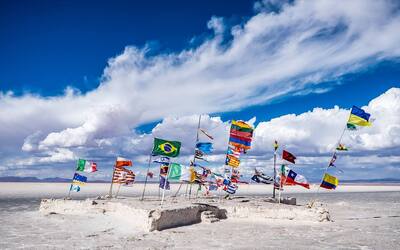Imagine yourself living in the location of your choice, enjoying the freedom to live life on your terms. You're confident that your wealth is safely secured in reliable banks, and no one can take it away from you. Your privacy remains your own personal affair, and you're not burdened by the weight of unnecessary taxes (or very little). It's a picture that sounds too good to be true, but it is not just another fantasy, it's the ultimate goal of the Flag Theory.
So what is flag theory? To put it simply, the Flag Theory is about breaking free from the constraints of a single nation-state and diversifying your personal and financial life. By establishing a "flag" in each location you inhabit, you adapt to its unique aspects: geography, finance, law, lifestyle, taxes, business, health, politics, investments, and more. This strategic approach allows you to create a life that is truly yours, untethered from the limitations of a single country.
By adopting the Flag Theory, you'll gain the freedom to make choices that align with your values and goals. You'll be able to move seamlessly between countries, cultures, and lifestyles, always staying one step ahead of the game.
Short Voyage Back in Time
The flags theory was introduced by Harry Schultz in 1964. He was a businessman, investor, and highly paid investment consultant, whose hourly rate was $4,500 per hour.
Schultz succeeded in introducing the concept of cosmopolitanism to modern society, creating the flag theory. At its base is the idea of a free life achieved through the possession of multiple passports. Essentially, it means having world citizenship. Schultz coined the term "Eternal Tourist" — a person who lives not in a specific country, but on the entire planet at once. They may own a home in one country, start a business in another, and obtain a passport in a third.
According to Schultz, the flag theory requires adherence to several simple conditions: possessing a second passport, having a safe location for storing main assets, and registering a legal address with the tax authorities outside of one's home country.
Initially, Schultz proposed three "flags" to be planted in suitable countries. Later, author William J. Hill (pseudonym) added new flags to the concept, transforming it into the "5 flags theory." In today's world, there is already a 7 flags theory, according to which individuals can plant not 5 flags but 7 to achieve financial freedom and security.
Flag 1: Citizenship and Residency
The flags you plant to acquire citizenship or permanent residency can have a profound impact on your overall strategy. A second passport, in particular, can significantly reduce sovereign risk and simplify international travel. However, citizenship is more than just a piece of paper – it's a binding agreement with the state that comes with both benefits and drawbacks.
Until recently, acquiring a second passport was a privilege reserved for those with direct lineage or the financially elite. The process was confusing, with unclear government instructions and complex immigration programs. But times have changed, and the landscape has shifted, today you can receive professional help from companies like Migronis to start your trip to freedom.
You can choose from various economic citizenship programs, such as:
- One-time donation to a government fund
- Purchasing real estate
Some countries offer citizenship by investment programs, where you can obtain citizenship in exchange for investing in the country's economy. For example, Portugal's Golden Visa program requires a €500,000 spent on units of investment/venture funds or €250,000 as a support for art and culture venue.
Or you can opt for traditional routes, including:
- Claiming citizenship by descent
- Naturalization through work permit and residence
- Right of soil (jus soli) for your children
Whether you're looking to diversify your assets, secure a safer financial future, or simply gain greater mobility, leveraging a flag theory dual citizenship idea can be a game-changer. The key is to carefully consider your options and choose the path that best aligns with your goals and circumstances.
Flag 2: Taxation of Physical Persons
Individuals are subject to taxation in various ways. We pay taxes when we earn income. We are taxed when we spend. Even when one passes away, their loved ones are taxed (Inheritance Tax).
This is why, when it comes to taxes, it's essential to select a jurisdiction with low taxes or no taxes at all. Some countries offer tax-free zones or special economic zones where businesses can operate with reduced or no taxes.
Different countries have different tax systems:
- Some countries, such as the United States, tax their citizens on their worldwide income, regardless of where they reside. (Hungary, Tajikistan, Eritrea, and Myanmar). So, it is a rare case when someone plans to utilize flag theory in the US.
- Others divide taxation into residency-based and non-residency-based systems, with different tax rates for residents and non-residents in different jurisdictions.
- Some countries exempt foreign-earned income from taxation.
- A few countries, such as the Vatican, Monaco, Antigua and Barbuda, Kuwait, Qatar, Oman, Saint Kitts and Nevis, the Cayman Islands, and Vanuatu, do not impose direct taxes on individuals or foreign-earned income.
Taxation is becoming increasingly complex as individuals and legal entities seek to optimize their tax payments, which is a legal and legitimate right. Courts have repeatedly ruled that tax evasion is a crime, while optimization is not. You are entitled to pay only what is required by law and no more.
It's worth noting that the G7 countries are actively opposing attempts at international tax optimization and low-tax jurisdictions. However, many individuals and companies are currently using legitimate means to minimize their taxes by utilizing offshore international corporations. The growing number of entrepreneurs working globally or independently are forming a new movement called Digital Nomads, who are trying to use various jurisdictions to their benefit.
Flag 3: Offshore Registration
Offshore registration involves registering your business or assets in a tax-efficient jurisdiction. This can help you reduce your tax liability, protect your assets from creditors, and maintain confidentiality.
Holding companies play a crucial role in business operations, allowing you to use them for various purposes. A company or corporation can take on debts and liabilities, purchase assets or property, and conduct business without having to do so in its name. This structure can also be used to open bank accounts, obtain citizenship, ensure confidentiality, transfer assets, create a tax shelter, and achieve many other goals.
Despite the efforts of G7 socialists to severely limit this option (transparency requirements), it's worth remembering that offshore companies remain a viable tool for individuals seeking to protect their assets and achieve their financial goals.
Popular offshore registration options include jurisdictions like Panama, Belize, and the Seychelles. These countries offer favorable tax laws, strict bank secrecy laws, and minimal bureaucracy.
Flag 4: Diversification of Bank Accounts
The country where you conduct business is almost as important as the bank itself. A system failure could wipe out your liquid assets. It's clear that this is a long-term strategy, but we must prepare for the worst and hope for the best. I don't like keeping all my money in one bank or in banks from the same country.
For many years, opening a foreign bank account was the simplest and most straightforward way to diversify one's assets. However, the situation has changed slightly, but the importance of having an offshore account remains unchanged. It's simply become more challenging to open one due to stringent banking requirements.
Why is it still necessary to open a bank account despite the increased requirements? The principle "don't put all your eggs in one basket" applies here: problems can arise not only at a specific bank but also in a country's financial system. For example, Russia's banking system is considered high-risk due to its government's control over banks, while Switzerland's banking system is low-risk due to its strict regulations and lack of government interference.
A foreign account can serve not only as a storage location but also as an earning platform: brokerage and investment accounts, business investments, and startups – the concept of a bank account has become broader in modern theory. For instance, a company based in Asia may consider opening an account in Singapore, known for its business-friendly environment and stable economy, while a company based in Europe may consider opening an account in Ireland, known for its low corporate tax rates. In addition, having an offshore account closer to clients can be beneficial for corporate accounts. As practice shows, when an account is closer to the clients being served, all operations run smoother and faster, which positively impacts business.
A wise advice would be to open bank accounts in as many jurisdictions as possible to minimize risks and maximize opportunities. This way, you can ensure that your assets are safe and secure, regardless of what happens in any particular country or region.
Flag 5: Physical Assets
Previously, this point was referred to as a "playground," a place of leisure. However, modern flag theory advocates for turning the entire world into a playground. Individuals find a place where they feel comfortable, where they can savor the moment. And when it becomes tiresome, they simply move on.
In today's context, it makes more sense to rename this flag as physical assets.
These can include:
- Real estate: owning a property in different regions or countries can provide a sense of security and flexibility.
- Precious metals: gold, silver, and other valuable metals can be stored in safe deposit boxes or vaults for long-term value preservation.
- Art and collectibles: investing in rare paintings, sculptures, or other unique items can provide a sense of pride and potential long-term appreciation.
- Vehicles: owning multiple vehicles in different locations can provide convenience and flexibility for travel.
Physical assets are liquid in different eras and periods. Land or a roof over your head, fertile soil, cannot completely devalue. And if you own them through a structured company, you can secure a secret sanctuary from the chaos of the world. By diversifying your physical assets across different jurisdictions and asset classes, you can create a more secure and resilient financial foundation.
Flag 6: Digital Security
The rise of the internet has revolutionized the way businesses operate. With the ability to work remotely and access global markets, companies must prioritize digital security to protect their assets and reputation.
Your digital presence is now a critical part of your business identity. Online security threats are more sophisticated and frequent than ever before. To stay ahead of these threats, you must take proactive measures to safeguard your digital infrastructure.
Many people choose Denmark to plant this flag. As, it consistently ranked among the top three in 10 out of a possible 15 years, excelling in specific areas such as the minimal percentage of users affected by ransomware trojans (0.02%) and cryptominers (0.11%). Denmark's impressive record also includes zero reported cases of mobile ransomware trojans and mobile banking trojans.
Flag 7: Digital Assets
Blockchain technology, the foundation of all cryptocurrencies and smart contracts, is revolutionizing the financial world in a literal sense. Instant transactions, high levels of anonymity and confidentiality, mutually beneficial and easily controllable contracts — these are just a few of the many features available today.
The cryptocurrency and digital asset market is volatile and unpredictable due to its youth, but already we see how investors, large corporations, and governments are placing their trust in it. Singapore took first place with a score of 50.2 out of 60 (83.76%). The local government closely collaborates with all market participants — banks, organizations, and the public — to optimize the development of the national cryptocurrency sector, and the tax system is favorable for cryptocurrency investors, according to the ranking compilers. Additionally, there is no capital gains tax in the country.
How One Can Benefit From the Theory of Flags
Meet James, who follows the Flag Theory. Let's imagine how his life could hypothetically look like.
James was born in Turkey, which passport ranked 39th in the Passport Index 2024. While it's not the most attractive passport, it's not bad either. However, if we look at the list of visa-free countries, it's not like James would want to travel there. Meanwhile, the US passport ranks 8th and has a very attractive visa-free geography. However, James knows that US citizens must pay US taxes regardless of where they live or for how long. Therefore, James chooses the Grenada passport: it's an easy-to-obtain passport for a donation of just $150,000 (note that after June 30th this sum will double), and it has favorable tax obligations.
James has his own business, selling products through Amazon. He decides to open a company in Hong Kong because he knows that income earned outside of Hong Kong is not subject to tax. Additionally, there are no taxes on capital gains, dividends, and VAT. Hong Kong companies are also not considered offshore companies (unlike those registered, for example, in St. Kitts and Nevis), and their tax policy is compliant with international organizations, so Hong Kong companies do not face legal issues in conducting business.
James likes to spend 2–3 months a year in Montenegro because he can relax and transition into a semi-retirement mode there. The cost of living is affordable, and taxes on consumption and VAT are low.
However, usually, James prefers to live in Malaysia because he obtained residency there through an investment program. Malaysia is a rapidly developing country with a tropical climate and a territorial tax system, which means James only needs to pay tax on income earned in Malaysia.
By the way, some of James' assets are stored in a Singaporean bank, known for its stable banking conditions and efficient judicial system.
James also maintains a blog and enjoys discussing controversial topics, so his hosting is located in Iceland, famous for its strict laws on data confidentiality and freedom of speech.
This example is just a rough plan intended to illustrate how the Flag Theory works. So, you can choose other countries to plant your flags.
Conclusion
While one can set as many flags as desired, it's essential to strike a balance. In pursuit of quantitative optimization, it's crucial not to overlook both common-sense and regulatory trends — both international and national — which can render excessive diversification meaningless or even dangerous if not handled properly.
For instance, achieving a zero-tax income and no requirements for declaring income may seem like an attainable goal, but it may ultimately create problems with using funds and financial accounts, even if it saves on taxes in the short term.
Creating a collection of passports is not always a guarantee of freedom of movement across borders, as it requires careful consideration of when and how to present them. Furthermore, it may not always facilitate access to the global financial system (e.g., having a Russian-sounding name with a passport from a banana republic may still raise red flags for many banks).
A thoughtful approach to setting flags, based on clear reasons and life circumstances specific to an individual, is essentially creating a life strategy. Overall, it's about diversification and creating opportunities for oneself and loved ones. However, this must be done within the bounds of the law and with compliance in mind.
If you're unsure about how to navigate these complexities or need expert guidance on creating a personalized strategy for your unique situation, we invite you to consult our team at Migronis. Our experienced professionals will help you make informed decisions and optimize your financial and personal plans.











